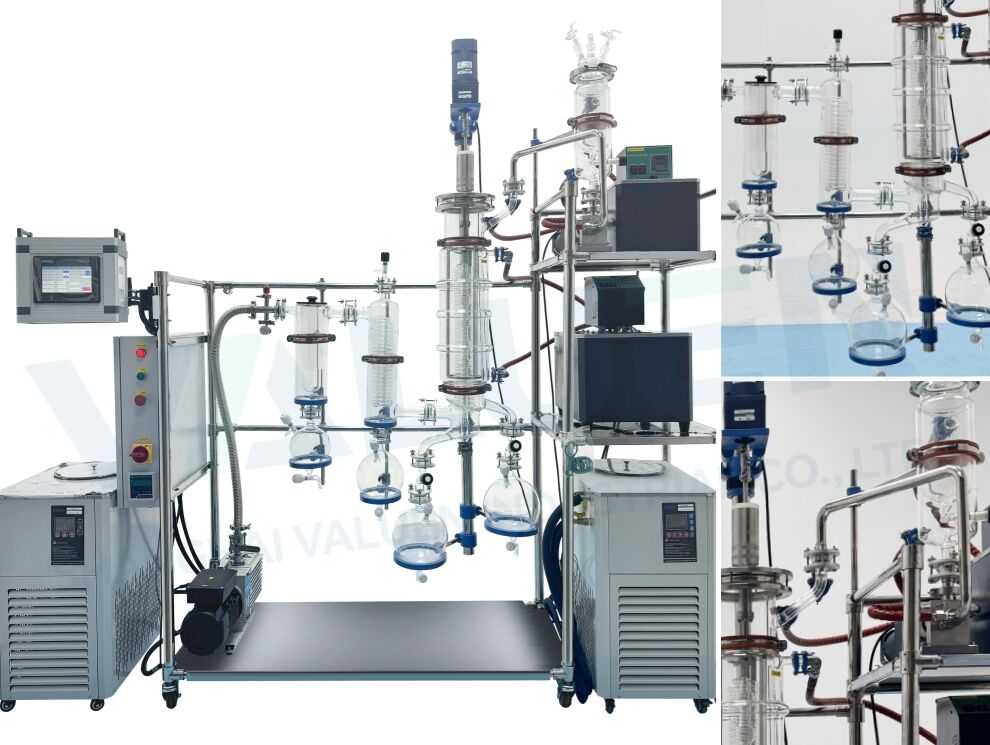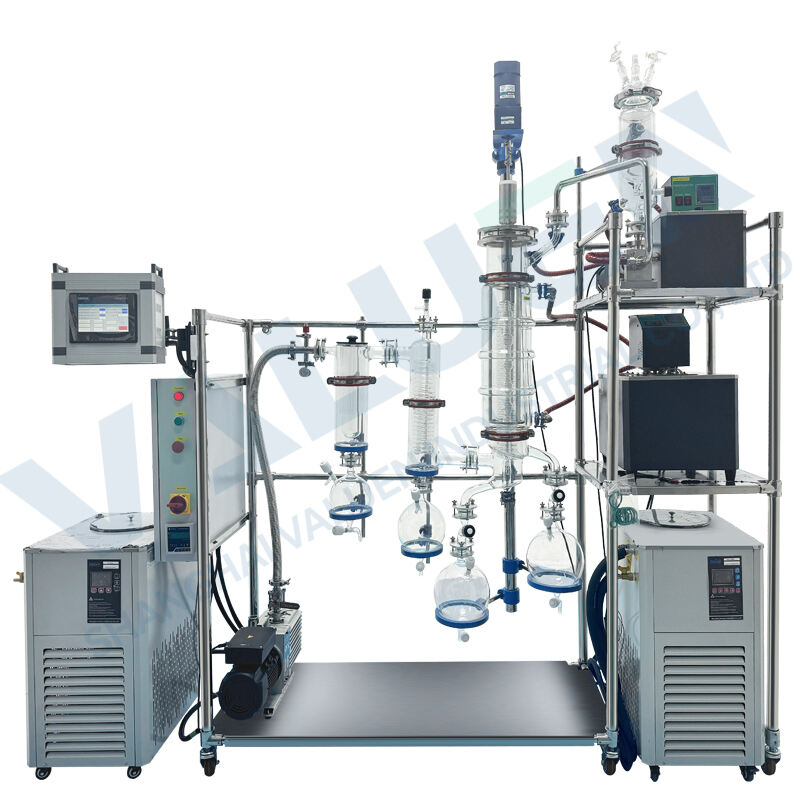Understanding the Power of Molecular Separation Technology
Glass molecular distillation systems represent a breakthrough in separation technology, offering unparalleled precision and efficiency in various industrial applications. These sophisticated systems utilize the principles of molecular weight differences and vapor pressure to achieve exceptional separation results under carefully controlled conditions. The glass construction provides unique advantages, including superior visibility of the process, excellent chemical resistance, and the ability to maintain high vacuum conditions essential for molecular distillation.
The technology behind glass molecular distillation systems has evolved significantly over the decades, enabling industries to achieve higher purity levels and better yields than ever before. By operating at extremely low pressures and carefully controlled temperatures, these systems can separate compounds with minimal thermal degradation, making them invaluable for processing heat-sensitive materials.

Essential Applications in the Pharmaceutical Industry
Drug Purification and Active Ingredient Isolation
In pharmaceutical manufacturing, glass molecular distillation systems play a crucial role in purifying active pharmaceutical ingredients (APIs). The gentle separation process ensures that thermally sensitive compounds remain intact while achieving the highest possible purity levels. This is particularly important for new drug development and the production of high-value pharmaceutical compounds.
The ability to process materials at lower temperatures while maintaining excellent separation efficiency makes these systems ideal for isolating and purifying complex pharmaceutical molecules. Manufacturers can achieve pharmaceutical-grade purity levels while minimizing product loss and maintaining the integrity of valuable compounds.
Natural Extract Processing
The pharmaceutical industry relies heavily on glass molecular distillation systems for processing natural extracts and botanicals. These systems excel at separating and concentrating bioactive compounds from plant materials, ensuring the final products maintain their therapeutic properties. The visual monitoring capability through glass components allows operators to optimize the process in real-time.
Many valuable plant-based compounds require careful handling to preserve their medicinal properties. Glass molecular distillation systems provide the perfect solution by offering gentle processing conditions while achieving high-quality separation results.
Advantages in the Cosmetics and Personal Care Sector
Essential Oil Refinement
The cosmetics industry benefits tremendously from glass molecular distillation systems in the processing of essential oils and fragrances. These systems excel at removing unwanted compounds while concentrating the desired aromatic components. The glass construction ensures that no contamination occurs during the process, maintaining the purity and quality of these valuable materials.
Essential oil manufacturers particularly appreciate the ability to monitor the distillation process visually, allowing them to make real-time adjustments for optimal results. The systems' capability to operate at low temperatures helps preserve the delicate aromatic compounds that give essential oils their unique properties.
Specialty Cosmetic Ingredient Production
In the production of specialty cosmetic ingredients, glass molecular distillation systems provide the precision needed for creating high-purity compounds. From vitamin concentrates to specialized lipids, these systems ensure consistent quality and optimal yield. The ability to process heat-sensitive materials without degradation is particularly valuable in this application.
Cosmetic manufacturers rely on these systems to produce innovative ingredients that meet increasingly stringent quality standards. The visual monitoring capability helps ensure process consistency and product quality, while the chemical resistance of glass components maintains product purity.
Critical Role in Food and Nutrition Industries
Nutritional Oil Processing
Glass molecular distillation systems are indispensable in the processing of nutritional oils, such as fish oils and specialty plant oils. These systems excel at removing environmental contaminants and unwanted compounds while preserving the beneficial nutrients. The gentle processing conditions ensure that temperature-sensitive compounds like omega-3 fatty acids remain intact.
The food industry values these systems for their ability to produce high-quality nutritional products while maintaining strict quality standards. The transparency of glass components allows for continuous monitoring of the distillation process, ensuring consistent results and optimal product quality.
Flavor Compound Concentration
In flavor production, glass molecular distillation systems enable the concentration and purification of volatile flavor compounds. The precise temperature control and low-pressure operation preserve delicate flavor profiles while removing unwanted components. This capability is crucial for producing high-quality natural flavors and food additives.
The systems' ability to handle small batches efficiently makes them particularly valuable for specialty flavor production, where product quality and consistency are paramount. The visual monitoring capability helps operators maintain optimal processing conditions throughout the production run.
Environmental and Industrial Solutions
Waste Oil Recycling
Glass molecular distillation systems play a vital role in environmental protection through their application in waste oil recycling. These systems can effectively separate valuable components from waste oils, enabling their recovery and reuse. The process helps reduce environmental impact while recovering valuable resources.
The systems' ability to handle complex mixtures and achieve high-purity separations makes them ideal for recycling applications. The transparent glass components allow operators to monitor the separation process and ensure optimal recovery of valuable materials.
Specialty Chemical Processing
In the chemical industry, glass molecular distillation systems are essential for processing specialty chemicals and high-value compounds. The systems' precise control capabilities and gentle processing conditions ensure high-quality results while minimizing product loss. The chemical resistance of glass components makes these systems suitable for handling a wide range of materials.
Chemical manufacturers appreciate the systems' flexibility in handling different products and batch sizes. The visual monitoring capability helps optimize processing conditions and ensure consistent product quality.
Frequently Asked Questions
What makes glass molecular distillation systems superior to other separation methods?
Glass molecular distillation systems offer unique advantages including superior process visibility, excellent chemical resistance, and the ability to process heat-sensitive materials at lower temperatures. They achieve higher purity levels and better yields while maintaining product integrity, making them ideal for high-value applications.
How do glass molecular distillation systems maintain product quality?
These systems operate under high vacuum conditions and carefully controlled temperatures, minimizing thermal degradation of sensitive compounds. The glass construction prevents contamination and allows visual monitoring of the process, ensuring consistent quality and optimal separation results.
What industries can benefit most from glass molecular distillation systems?
The pharmaceutical, cosmetics, food and nutrition, and specialty chemical industries benefit most from these systems. They are particularly valuable for applications requiring high purity levels, gentle processing conditions, and the ability to handle heat-sensitive materials efficiently.

